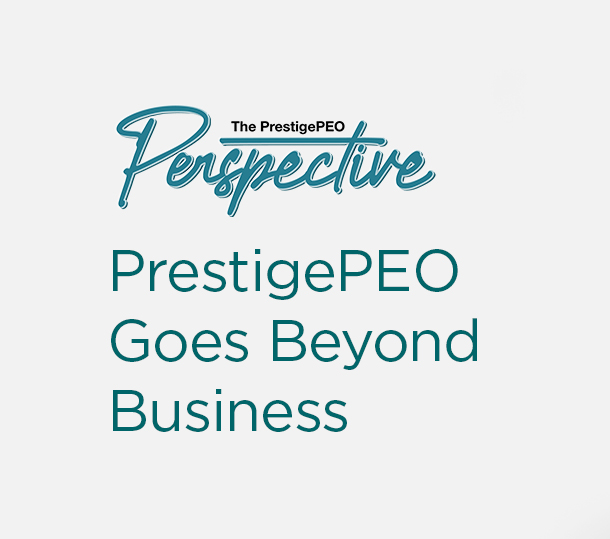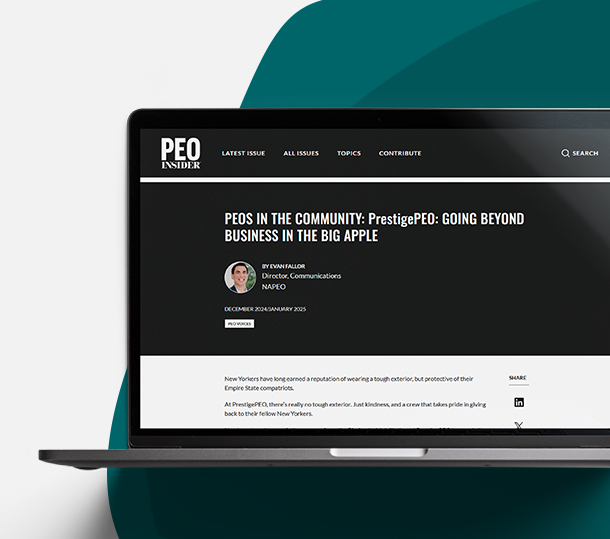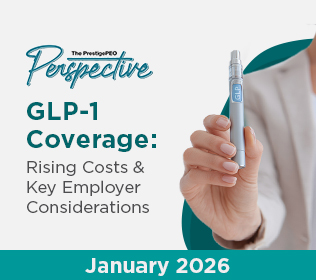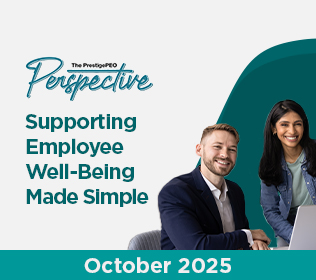How PrestigePEO is Committed Building Stronger Businesses and Communities Together
At PrestigePEO, success isn’t just about business growth; it’s about making a meaningful impact in the communities where we live and work. Proof of this commitment is evident as NAPEO featured us in this month’s PEO Insider for our community-focused initiatives.
The article “PEOs in the Community: PrestigePEO Going Beyond Business in the Big Apple” highlights how we help small and medium-sized businesses (SMBs) thrive while fostering more substantial, more vibrant communities. From supporting local charities to empowering wellness initiatives, our approach reflects our commitment to being more than a service provider—we’re your partner in creating positive change. Learn more about our philanthropic efforts and how we’re dedicated to making a positive impact in and out of the office!
Balancing The Cost and Value in Employee Benefits
Maximize the Value of Employee Benefits
Employee benefits are essential for attracting and retaining top talent, but they’re also one of the largest expenses for SMBs. Discover six strategies to balance costs while maximizing employee satisfaction and business growth, including how partnering with PrestigePEO can help.
Attract Top Talent with Better Employee Benefits
Give Your Business a Competitive Hiring Edge
Did you know 90% of job seekers prioritize employee benefits when choosing a role? Offering health insurance, retirement plans, and life insurance can set your small and medium-sized business (SMB) apart from the competition. Learn how partnering with PrestigePEO allows you to access premium benefits typically reserved for large corporations—without breaking the bank.
Key Labor Laws for Managing Remote Teams
Remote Workforce Compliance Made Easy
Remote work offers flexibility, but it also brings new compliance challenges for SMBs. From FLSA and FMLA requirements to multi-state tax complexities, managing remote teams requires careful attention to labor laws. Learn how PrestigePEO can simplify compliance and protect your business.

2024 State Ballot Measures Affecting Wage Policies and Employee Benefits Court Ruling
As the dust settles on the 2024 elections, employers must prepare for significant shifts in wage policies and employee benefits. Several states approved key ballot measures directly affecting wage policies and labor costs of paid sick leave, minimum wage, and tipped worker pay. For example, Missouri and Alaska voters approved paid sick leave and minimum wage increases. Below are the highlights of significant developments.
Paid Sick Leave Expansion
Alaska, Missouri, and Nebraska voters overwhelmingly approved ballot measures mandating paid sick leave for employees. In 2025, Missouri and Nebraska will begin accruing paid sick leave with hourly requirements like those of Alaska. Missouri and Alaska employers must provide up to 56 hours of paid sick leave annually for workplaces with 15+ employees and up to 40 hours for smaller employers. Nebraska employers with 20+ employees can earn up to 56 hours of paid sick leave annually, with smaller employers required to provide up to 40 hours.
Minimum Wage Increases
Two states approved increases to the minimum wage, which will be phased in over the next few years. Alaska’s minimum wage will rise to $15.00/hour by mid-2027. Missouri’s minimum wage will reach $13.75/hour in 2025 and $15.00/hour in 2026. By contrast, California’s proposed minimum wage hike failed to gain voter support, maintaining the state’s existing wage structure.
Tipped Worker Pay
Proposals to alter tipped wage structures faced challenges this election cycle. Voters in Arizona and Massachusetts rejected measures that would have amended tipped worker pay policies. For instance, Arizona sought to lower the tipped wage floor further, while Massachusetts aimed to bring tipped workers’ pay in line with the state minimum wage over time. Both measures were defeated.
Broader Implications for Employers
These state-level changes underscore the evolving landscape of employment law. Employers in these states must prepare to update payroll systems, revise employee handbooks, and ensure compliance with these new laws.
Navigating these changes alone can be overwhelming. Partnering with PrestigePEO ensures your business stays ahead of regulatory shifts while offering robust HR solutions and employee benefits. Contact us today to learn how we can help your business grow and thrive in this changing landscape.

DOL Provides Further Guidance on FMLA Leave for Clinical Trial
On November 8, 2024, the Wage and Hour Division of the Department of Labor issued an opinion clarifying that the use of leave under the Family and Medical Leave Act for eligible employees participating in clinical trials for treatment of serious medical conditions is permitted. The DOL affirmed the permitted use of the FMLA protected leave benefit to include clinical intervention trials, and outlines that the treatment is covered regardless of whether the trials are experimental in nature or involve placebos.
Key takeaways from this opinion letter include:
- Employees who otherwise meet all other FMLA eligibility criteria may take leave for clinical trial purposes.
- The term “treatment” is defined very broadly by the FMLA, including those clinical trials that may or may not be effective in every case.
- The optional, voluntary, or elective nature of the treatment is not allowed to be a factor in determining the validity or permissibility of an employee’s request to take FMLA leave.
- Employers are precluded from asking about the effectiveness of a treatment, inquiring about specific medications prescribed, or any details of the treatment plan in evaluating eligibility under FMLA leave. The certification process remains the same, leaving employers permitted to only verify that an employee has a serious health condition that requires a health care provider’s treatment when responding to leave requests.
As a reminder, many state laws follow the FMLA leave entitlement provisions and will also need to be considered.
FMLA leave policies can be challenging, especially with evolving guidance like this. At PrestigePEO, we specialize in helping businesses stay compliant while supporting their employees’ needs. From managing leave requests to ensuring compliance with federal and state laws, we’re here to make HR easy and efficient for your business.
Discover how PrestigePEO can support your business. Contact us today to learn how we can help streamline HR processes and ensure compliance with confidence.

Post-Election Recap: Marijuana Legalization in the U.S.
The November 5, 2024, elections brought significant developments in marijuana legalization across the United States. Nebraska voters approved medical marijuana use, marking a milestone for the state. However, ballot measures to legalize recreational marijuana were rejected in Florida, North Dakota, and South Dakota. In Massachusetts, a measure to legalize psychedelic drugs, including magic mushrooms, was also defeated. These developments highlight the evolving landscape of marijuana legalization and its implications for public policy, healthcare, and the workplace.
As of now, 38 states have legalized medical marijuana, and 24 states, plus Washington, D.C., have legalized recreational marijuana. Despite the growing acceptance, challenges remain, particularly around legal frameworks, workplace policies, and enforcement.
Recreational Marijuana is legal in the following states: Alaska, Arizona, California, Colorado, Connecticut, Delaware, Illinois, Maine, Maryland, Massachusetts, Michigan, Minnesota, Missouri, Montana, Nevada, New Jersey, New Mexico, New York, Oregon, Rhode Island, Vermont, Virginia, Washington, Washington, D.C.
Medical Marijuana Legalization includes all recreational-use states, plus Alabama, Arkansas, Florida, Georgia, Hawaii, Iowa, Kansas, Kentucky, Louisiana, Mississippi, Nebraska (new), New Hampshire, North Dakota, Ohio, Oklahoma, Pennsylvania, South Carolina, South Dakota, Tennessee, Texas, Utah, West Virginia, Wisconsin, and Wyoming.
Employer Considerations
The growing use of cannabis creates complex challenges for employers. While state laws on drug testing and workplace policies vary, businesses can still prohibit marijuana use and impairment during work hours and may terminate employees who violate these policies. The Americans with Disabilities Act does not recognize medical marijuana use as a protected accommodation.
Employers in industries regulated by federal agencies, such as the Department of Transportation, must maintain strict drug-testing protocols. Marijuana remains illegal at the federal level, impacting industries with strict compliance requirements.
What Employers Should Know as We Enter 2025
As marijuana laws continue to evolve, employers must navigate a complex legal landscape in 2025. Key considerations include reviewing and updating workplace drug policies to align with current state laws, clarifying expectations regarding marijuana use and impairment on the job, and monitoring legal updates.
Employers must balance accommodating changing societal norms with maintaining safe and productive workplaces. Starting the year with a clear plan for addressing marijuana-related workplace issues will help organizations adapt to this shifting regulatory environment.
As marijuana legalization continues to evolve, staying compliant with state and federal regulations can be challenging for businesses. PrestigePEO provides the expertise and tools to manage workplace policies, ensure compliance, and maintain a safe and productive work environment.
Partner with PrestigePEO to simplify HR compliance for your business. Contact us today to learn how we can help you adapt to regulatory changes, protect your business, and effectively support your employees.

New York's Equal Rights Amendment, “Proposition 1” Passes; What Employers Need to Know
On November 6, 2024, New York voters approved the Equal Rights Amendment, or “Proposition 1. This amended the state constitution codifies voters decision to prohibit discrimination based on race, color, ethnicity, national origin, age, disability, creed, religion, sex, sexual orientation, gender identity, gender expression, pregnancy/pregnancy outcomes, and reproductive healthcare, otherwise expanding the provision of the existing constitutional civil rights. This goes into effect on January 1, 2025.
Expanded Anti-Discrimination Obligations for New York State Employers – Employers must ensure that their policies and practices do not discriminate based on the newly protected categories. Existing laws already prohibit such discrimination, but the Equal Rights Amendment enforces these protections in the state constitution.
Recommended Actions for New York State Employers – Revise employee handbooks, codes of conduct, and anti-discrimination policies to include the newly protected categories. Employers should also consider implementing new training for all employees, especially management and HR. Updating procedures for employees to report discrimination or harassment related to the newly protected categories is also a good idea.
By proactively addressing these areas, employers can ensure a safe workplace and mitigate the risk of discrimination claims under the expanded protections of New York’s constitution.
The passage of New York’s Equal Rights Amendment brings significant changes that businesses must address. PrestigePEO offers comprehensive HR support to help employers update policies, provide training, and ensure compliance with evolving workplace regulations.
Let PrestigePEO empower your business. Contact us today to learn how we can assist with policy updates, employee training, and fostering a compliant and inclusive workplace.









